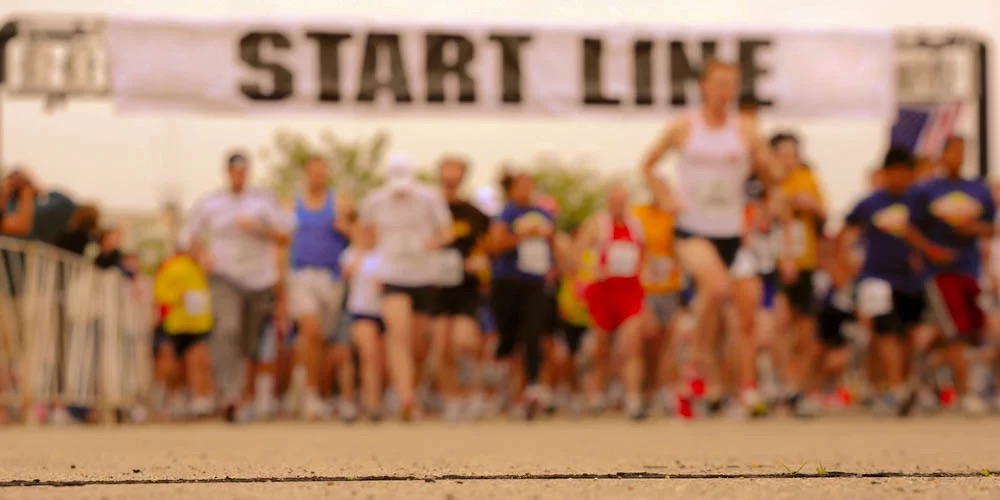After months of hard work and training, you must be careful not to make mistakes on race day, to avoid the efforts made during preparation becoming useless. In this article, we show seven common mistakes you should avoid on race day.
1. Starting without knowing the route
Knowing the race course in advance can help you plan a race strategy and adapt it to the race conditions. The most important variables to consider are the presence of positive/negative elevation gain, passages or sharp bends and refreshment areas. Planning hydration and nutrition along the route, especially for long distances such as a marathon or half marathon, can make the difference between a successful run and a disappointing result.
2. Not being rested and relaxed
It is easier said than done: often the tension is so high that the night before the race you don’t sleep a wink, or on the start line anxiety causes stomach upsets. It is important to try to relax and distract yourself, go to bed early the night before, and avoid stressful conversations or discussions. Keeping your body and mind calm will help you maintain high energy levels and achieve your running goals. Remember, the hardest part of the marathon, or any other distance, is the preparation, so do your best to be rested and relaxed on race day ?
To arrive on race day not only with a relaxed mind but also with relaxed muscles, it is necessary to plan a ‘tapering’ phase, i.e. a progressive reduction in training load in the weeks leading up to the competition. Click here for more information.
3. Underestimating the warm-up
A mistake to avoid on race day is to underestimate the importance of the warm-up. It is necessary to give the body enough time to prepare for the physical effort ahead. A proper warm-up heats up your muscles, increases your body temperature and improves blood circulation, as well as preventing the risk of injury.
Start with some light stretching movements to improve muscle flexibility. Then, do a few laps at a slow pace to ‘start the engine’ and allow the muscles to gradually adapt to the effort. This will also increase blood flow to the muscle tissue. If you wish, you can do a few accelerations before the start. However, be careful not to overdo it and force your muscles too hard. The last thing you want is to injure yourself just minutes before the start!
4. Try new things
Avoid trying new things on race day. Try everything out during training! Do not use new shoes for the first time during the competition, they could cause blisters or even injuries. Also with regard to clothing, it is advisable to wear the clothes you are used to; some clothes may be poorly breathable and cause excessive sweating.
The same applies to experimenting with new foods: whether it is a breakfast, a gel or a sports drink, there is always the risk of side effects and stomach problems.
5. An incorrect diet
In order to achieve a successful performance and avoid digestive problems, it is essential to follow a proper diet both during preparation and competition. The aim is to start the race with good energy reserves and to refuel adequately during the event. For the pre-race breakfast (which should be eaten at least three hours beforehand), we recommend choosing carbohydrate-based foods with low fat, fibre and protein to aid digestion. Tension can play tricks on you, so try to consume easily digestible foods.
During a marathon, you need 30-60 grams of carbohydrates per hour (it is preferable to divide your intake into 10-20 grams every 20 minutes). Furthermore, you should never skip a refuelling point to hydrate and take in the right nutrients.
Read more about this in our article on nutrition on marathon/half-marathon day.
6. Not hydrating properly
Another frequent mistake is not drinking enough. When physical exertion is so prolonged and exhausting, dehydration can be very dangerous. Do not wait until you are thirsty to drink, as this means that your body is already dehydrated.
It is important to start the run with a full tank, but without overdoing it. This is because on the one hand everything that is drunk in excess has to be transported and on the other hand expelled through urine. We recommend drinking 500 ml of sports drink (6-8% carbohydrate) 1-2 hours before the start, preferably in portions. 30-15 minutes before the race starts, you can drink a further 3 dl.
During the race, the following formula can be used to calculate the amount of liquid to drink:
KG body weight x KM distance = ML of liquid
Do not drink the entire dose at once, but in smaller quantities at 20-minute intervals. Sports drinks containing electrolytes (such as potassium and sodium) or carbohydrates help restore energy.
For more information, see our article on hydration on race day.
7. Starting too fast and not listening to your body
Finally, our advice is to avoid starting off too fast during the race, even if adrenaline and enthusiasm are sky-high and the group is running fast. This mistake is very common among runners, but it can lead to energy depletion and compromise performance. Even if the temptation is strong, try to stick to the times you had planned.
The running.COACH time calculator can be of great help in calculating your planned running time. Not only do you get an indication of the expected finish time, but also a detailed table with mileage times adapted to the route profile.
You might also be interested in this article:
7 most common mistakes in marathon preparation
Create a personalized and dynamic training plan with running.COACH that, starting from your current fitness level, will prepare you optimally for your running goals. Try running.COACH for free for two weeks after the first login!



